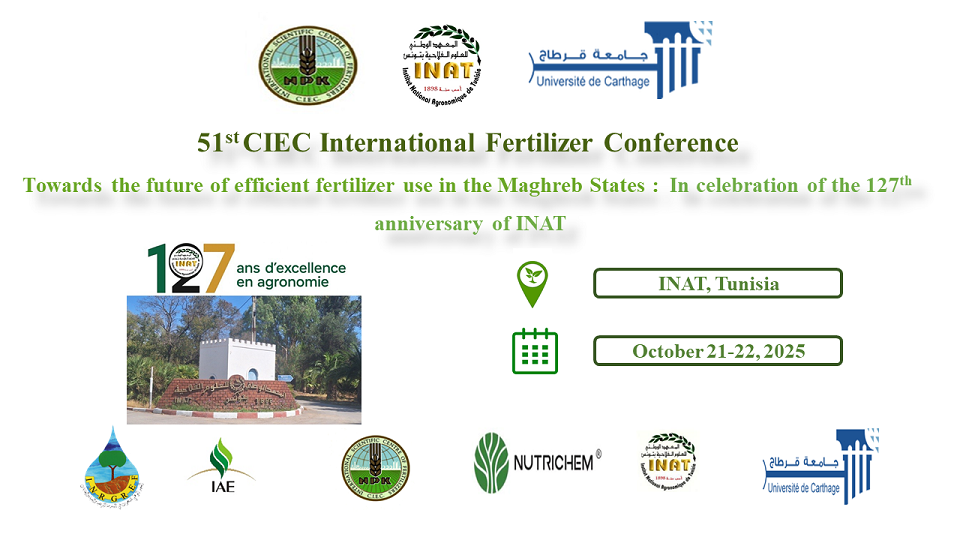
|
|
|
|
Home Dear colleagues, The University of Carthage (UCAR), in collaboration with the International Organizing Committee of CIEC (China) and the National Agronomic Institute of Tunisia (INAT), is delighted to invite you to participate in the 51st International Fertilizer Conference (CIFC51). This prestigious event will take place from October 20 to 22, 2025, at the National Agronomic Institute of Tunisia (INAT), Tunis, which is celebrating its 127ᵗʰ anniversary, a milestone reflecting its rich heritage and ongoing commitment to innovation, excellence in education, research, and international cooperation. Founded in 1898 under the joint authority of UCAR and the Institution of Agricultural Research and Higher Education (IRESA), INAT is the oldest engineering school in Tunisia and Africa, recognized nationally and regionally for its leadership in agricultural sciences, food systems, natural resources management, and sustainable development. CIFC51 will bring together researchers, experts, and stakeholders from around the world to share knowledge, exchange experiences, and explore innovative approaches for sustainable fertilizer management in the Maghreb region. The program will feature scientific sessions, in-depth discussions, interactive workshops, and valuable networking opportunities, providing an excellent platform to foster collaboration and address current challenges in agriculture. We warmly invite you to join us in the vibrant setting of Tunisia for an inspiring and impactful conference that combines scientific excellence with international cooperation and cultural exchange. University of Carthage Established in 1988, the University of Carthage is a Tunisian public institution dedicated to education and research. Operating under the supervision of the Ministry of Higher Education and Scientific Research, UCAR is committed to fostering academic excellence and innovation. As a multidisciplinary university, UCAR spans a wide range of fields and offers 289 degrees across various levels of education, including: Preparatory cycles for engineering.
As part of its commitment to excellence, the University of Carthage has obtained the ISO 9001:2015 certification, demonstrating its dedication to maintaining high-quality standards in all its processes, both academic and administrative. CIEC – at a glance (http://ciec.iae.ac.cn/) The International Center for Chemical Fertilizers (CIEC) is the oldest scientific organization solemnly dedicated to all issues of fertilizers and fertilization. CIEC was founded in 1932/1933 at the first International Scientific Conferences for Fertilizers in Rome and Amsterdam. CIEC is a non-profit, non-governmental organization (NGO) and organized as a task force with membership on invitation only. CIEC was merged with CIEC-ASIA (founded in 2016) in 2019. CIEC provides annual events to present and discuss scientific issues of fertilizer research and encourage international networking between stakeholders in science, industry, and politics. Until today CIEC conducted 18 World Fertilizer Congresses (in a 6-year rotation) in: Liniy, Beijing, Bucharest, Budapest, Chiang Mai, Ghent, Heidelberg, Lisbon, Moscow, Nicosia, Opatija, Rio de Janeiro, Rome (3), Shenyang, Vienna, Zurich (1932-2025: in total est. 12.300 participants) and 31 Fertilizer Symposia (held annually) in Athens, Bari, Benghazi, Berlin, Brauschweig (3), Balatonfured, Cairo (2), Christchurch, Coimbra, Debrecen, Ghent, Goslar, Groningen, Guilin, Helsinki, Kusadasi, Nicosia, Pretoria, Pulawy, Rome (2), Salamanca, Santa Clara, Son, Suceava, Tokat, Vienna (2) (1932- 2023): in total est. 13.000 participants). Together these are 50 events making the event in Tunis, Tunisia in 2023 the 51st and the second one carrying the new branding “CIEC International Fertilizer Conference”. The National Agronomic Institute of Tunisia UCAR, CIEC and INAT are organizing the 51st CIEC International Fertilizer conference : In celebration of the 127th anniversary of INAT The National Agronomic Institute of Tunisia is the oldest agricultural engineering school in Tunisia and Africa, founded in 1898. It operates under the joint supervision of the Ministry of Agriculture, Water Resources and Fisheries and the Ministry of Higher Education and Scientific Research, with academic affiliation to IRESA and the University of Carthage.
Scope of the 51st International Fertilizer Conference Food security and food safety are of prime interest on a global scale as are environmental aspects and soil protection issues. Agricultural production in the Maghreb States faces stress factors such as drought and salinity so fertilizer practices counteracting these adverse conditions are of prime relevance. CIFC´s ambition is to strengthen scientific exchange and cooperation to support this global challenge. With almost 90 years of global networking in the fertilizer research sector, the 51st International Fertilizer Conference will be a unique venue to present cutting-edge science to pursue this ambitious project not only in the Maghreb region. The event is hosted by the University of Carthage (UCAR) in Tunis, Tunisia. The 51st International Fertilizer Conference is thematically dedicated to issues of plant nutrition, soil science, fertilizers, and fertilization: CIFC welcomes contributions in the following general research areas:
with a special focus on the following thematic clusters:
|

